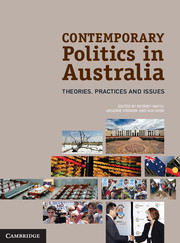Book contents
- Frontmatter
- Contents
- Tables and figures
- Contributors
- Acknowledgements
- Introduction
- I Contemporary Theories of Australian Politics
- Part II Politics in Everyday Australian Life
- Introduction to Part II
- 7 Political values and attitudes
- 8 Political socialisation
- 9 Media politics
- 10 Politics in Australian culture
- Part III Elections
- Part IV Participation and Representation
- Part V Inside the Australian State
- Part VI Contemporary Public Controversies
- Glossary
- References
- Index
- References
8 - Political socialisation
from Part II - Politics in Everyday Australian Life
Published online by Cambridge University Press: 05 June 2012
- Frontmatter
- Contents
- Tables and figures
- Contributors
- Acknowledgements
- Introduction
- I Contemporary Theories of Australian Politics
- Part II Politics in Everyday Australian Life
- Introduction to Part II
- 7 Political values and attitudes
- 8 Political socialisation
- 9 Media politics
- 10 Politics in Australian culture
- Part III Elections
- Part IV Participation and Representation
- Part V Inside the Australian State
- Part VI Contemporary Public Controversies
- Glossary
- References
- Index
- References
Summary
Political socialisation deals with identity or subject formation, which is a central concern of those who engage in discourse theories and post-structuralism (Chapter 5). Before going to these theories, however, readers might first engage with Chapters 1 and 3. Democratic theories and behaviouralism both tend to assume stable identities, or subjectivities, into which citizens become socialised through the processes discussed in this chapter. Chapters 1 and 3 might be followed by a consideration of critical theorists (Chapter 4), who also assume the existence of stable identities or subjectivities, and who see them as binding people into unequal and unfair social structures. Chapter 5, though, must be read by those interested in the study and processes of political socialisation, for the ways in which discourse theories and post-structuralism contest both the existence of stable identities or subjectivities and the processes by which these are held to be formed.
This chapter examines political socialisation, the process by which individuals come to possess and exhibit particular political views or behaviours – for example, about party allegiance, political interest or perspectives on issues such as the welfare state, defence or unionism. It employs a historical lens, with the first subject of inquiry being the discipline of political socialisation itself; this emerged in the late 1950s, encountered the 1960s and was all but abandoned by the 1980s, before being tentatively revived in more recent years. This is essential to prevent confusion over the use of a term that has a somewhat contentious history, and to elicit meaning about what is meant by socialisation.
- Type
- Chapter
- Information
- Contemporary Politics in AustraliaTheories, Practices and Issues, pp. 83 - 93Publisher: Cambridge University PressPrint publication year: 2012



